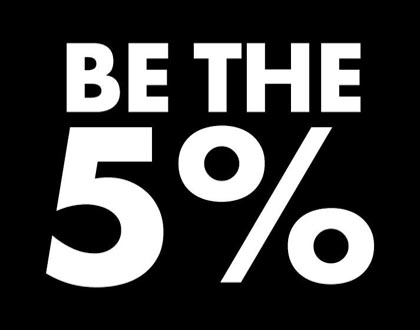Life
If You Have This Attachment Style It’s Killing Your Success
To ensure that your attachment patterns never hold you back in life, you must employ reliable anchors.

Attachment styles are a popular framework used by many in this day and age, but what is your “attachment style” exactly?
Your attachment style refers to the way you formed close, long-term bonds with first your mother and father and then other humans later in life.
If you had caregivers that were reliable and responsive to your needs most of the time, you were essentially given the privilege of what is called a “secure attachment”.
You would then grow up to be able to approach your relationships with that same responsiveness, security and warmth you were given as a baby.
A secure attachment style is a valuable resource when it comes to success in all areas of life. When you’re securely attached, you have stronger footing and a larger “emotional bank” to draw from in every challenge that is thrown your way in relationships or business.
Simply put, you have greater resilience to “bounce back” from any challenge that’s thrown your way in relationships, business and health.
But what if you weren’t lucky enough to be given the gift of a secure attachment style?
What if, like 40% of the population, you have what is called an insecure attachment style?
If you are someone with an anxious, disorganised or avoidant attachment style, then you’ll want to be aware of 3 key ways insecure attachment patterns will sabotage your success.
Also know that it’s completely possible to heal and develop what is called “earned secure attachment”.
#1: Being Insecurely Attached Makes Us Averse to Taking Healthy Risks.
To be risk averse means: “to be unwilling to take risks or wanting to avoid risks as much as possible.”
Research has shown that it is actually people who are insecurely attached who are more risk taking.
However, this is only in the context of unhealthy risk taking related to what is called “fast-life” strategies.
Alternatively stated, insecure attachment can make us take uncalibrated risks in the short-term at the cost of our health and success in the long-term.
In fact Studies have shown that insecurely attached individuals, having been raised in an unpredictable environment, adopt fast life strategies that focus on short-term benefits and neglect long-term ones, and form distorted perceptions of risk/safety.
This sabotages our success in the long-term due to unhealthy, uncalibrated risk taking in the short term.
Often an insecurely attached individual will not take the types of risks that will help them get positive results in their life.
I’m not talking about standing on the edge of a cliff to take a cool photo for social media here.
I’m talking about healthy risk taking behaviours like assuming the emotional and psychological risk to reach out and make a new connection.
That emotional risk requires comfort with vulnerability and the ability to regulate your emotions, which insecurely attached people struggle with.
Consider also the well thought-out steps required to execute on a business plan.
Or the willingness to spend money testing new avenues for acquiring customers and to observe the results of these tests with conscientiousness.
These types of healthy risks are essential to one’s success and ability to create an infinite life.
As an individual with insecure attachment, you won’t have the certainty and stability within yourself that is needed for you to feel safe to go out there in the world and take the big steps you need to take.
What’s the solution?
Give back to yourself the stability and reliable nurturing that wasn’t given to you as an infant.
This could mean reassuring yourself that you have everything you need within your already to make big steps towards your destiny.
“Understanding your own attachment style can be a powerful tool for personal growth and improving your relationships.” – Amir Levine
#2: It Will Be harder to Form Quality Relationships With People
The value of human relationships lies in the mutual connection you both feel.
This connection bonds you to each other and adds real value to your life in the form of warmth and security.
However, these types of connections can only develop if you are ok with intimacy.
Unfortunately, insecurely attached people are not only uncomfortable with intimacy, they tend to see it as unsafe.
That is to say that if you have insecure attachment, you likely don’t trust intimacy, relationships or people very easily.
In fact it will be a struggle for you to value connection and intimacy.
As such, you will be in danger of sabotaging your relationships and the quality of each of your relationships will also be lower.
In the context of business and your career, you may be more likely to be ostracized from your colleagues or not be able to be attuned to your bosses requests, leading to quicker isolation and less likelihood of a promotion in the workplace.
All of this leads to lower life satisfaction and less success, because the quality of your life is in direct proportion to the quality of the relationships you build.
The solution?
Consistently striving to remove your masks and build intimacy with people you trust (and who are worthy of it).
Reach out and connect with a vulnerable story or with simple playfulness. This helps to massage through the knots of anxiety and trauma you have developed around intimacy.
In the workplace, the solution is to be less in your own anxiety and instead develop the capacity to attune to the goals of your team or your boss.
#3: You’re Not Able to Deal With Conflict
How does it make you feel when conflict shows up in your relationship or at work?
Are you inclined to feel stressed and overwhelmed? Or are you pretty relaxed and able to lean into the conflict, knowing it will be ok (and that you will be ok)?
Worse still, are you known to escalate conflicts further (perhaps unintentionally and unnecessarily?)
How you deal with conflict is deeply affected by your attachment patterns, and here’s why…
It’s because your attachment styles shaped your nervous system, likely before you could even form two sentences together.
If you had inconsistent nurturing, responsiveness and care from your mother (or caregiver), you learned pretty quickly that you need to escalate your cries for attention and closeness.
This shapes your nervous system to go from 0 to 100 in an instant if you’re an anxiously attached individual.
If you’re avoidant, you shut your attachment system down altogether and become completely unable to be present during key moments during conflicts in your working relationships.
What this amounts to is a quicker death to any relationships you have, due to you being unable to be emotionally and physically present during conflict.
If you’re anxious, you might also escalate conflicts too fast and completely sabotage your relationships, losing your partner’s trust in an instant.
How do you fix this?
If you’re anxiously attached, learn to recognize your triggers.
Consciously notice the stress in your body escalating, and literally take a deep breath.
Make it audible and visible if you need to, there’s no need to fear judgement.
Simply allow yourself a moment to de-escalate your own stress and then come back to the conflict with a newfound presence.
How To Ensure Your Attachment Style Never Holds You Back Again
To ensure that your insecure attachment patterns never hold you back in life again, you must employ reliable anchors to help bring you back to a state of trusting connection.
Because it doesn’t matter whether you have avoidant, anxious or disorganized attachment patterns, they are all just on a spectrum and at the core of them is two things:
#1: The deep fear that you aren’t worthy of love, connection and happiness.
#2: And a lack of trust in vulnerability, connection and intimacy.
Now, intimacy doesn’t just mean the physical kind, it means the emotional and spiritual kind as well.
So what you need to do is have a specific beautiful memory of a positive attachment to someone from your past.
Alternatively, get a song or a movie scene to watch or listen to every time you feel yourself sabotaging your career or your relationships.
Something that calms your nervous system and makes you feel more willing to connect with others.
Of course this needs to be personal to you, and you will know better than anyone which anchors will work to act as the “secure base” you need and the nurturing you weren’t reliably given.
Did You Know
How Skilled Migrants Are Building Successful Careers After Moving Countries
Behind every successful skilled migrant career is a mix of resilience, strategy, and navigating systems built for locals.

Moving to a new country for work is exciting, but it can also be unnerving. Skilled migrants leave behind familiar systems, networks, and support to pursue better job opportunities and a better future for their families. (more…)
Life
10 Research-Backed Steps to Create Real Change This New Year
This New Year could finally be the one where you break old patterns and create real, lasting change.

Every New Year, we make plans and set goals, but often repeat old patterns. (more…)
Life
9 Harsh Truths Every Young Man Must Face to Succeed in the Modern World
Before chasing success, every young man needs to face these 9 brutal realities shaping masculinity in the modern world.

Many young men today quietly battle depression, loneliness, and a sense of confusion about who they’re meant to be.
Some blame the lack of deep friendships or romantic relationships. Others feel lost in a digital world that often labels traditional masculinity as “toxic.”
But the truth is this: becoming a man in the modern age takes more than just surviving. It takes resilience, direction, and a willingness to grow even when no one’s watching.
Success doesn’t arrive by accident or luck. It’s built on discipline, sacrifice, and consistency.
Here are 9 harsh truths every young man should know if he wants to thrive, not just survive, in the digital age.
1. Never Use Your Illness as an Excuse
As Dr. Jordan B. Peterson often says, successful people don’t complain; they act.
Your illness, hardship, or struggle shouldn’t define your limits; it should define your motivation. Rest when you must, but always get back up and keep building your dreams. Motivation doesn’t appear magically. It comes after you take action.
Here are five key lessons I’ve learned from Dr. Peterson:
-
Learn to write clearly; clarity of thought makes you dangerous.
-
Read quality literature in your free time.
-
Nurture a strong relationship with your family.
-
Share your ideas publicly; your voice matters.
-
Become a “monster”, powerful, but disciplined enough to control it.
The best leaders and thinkers are grounded. They welcome criticism, adapt quickly, and keep moving forward no matter what.
2. You Can’t Please Everyone And That’s Okay
You don’t need a crowd of people to feel fulfilled. You need a few friends who genuinely accept you for who you are.
If your circle doesn’t bring out your best, it’s okay to walk away. Solitude can be a powerful teacher. It gives you space to understand what you truly want from life. Remember, successful men aren’t people-pleasers; they’re purpose-driven.
3. You Can Control the Process, Not the Outcome
Especially in creative work, writing, business, or content creation, you control effort, not results.
You might publish two articles a day, but you can’t dictate which one will go viral. Focus on mastery, not metrics. Many great writers toiled for years in obscurity before anyone noticed them. Rejection, criticism, and indifference are all part of the path.
The best creators focus on storytelling, not applause.
4. Rejection Is Never Personal
Rejection doesn’t mean you’re unworthy. It simply means your offer, idea, or timing didn’t align.
Every successful person has faced rejection repeatedly. What separates them is persistence and perspective. They see rejection as feedback, not failure. The faster you learn that truth, the faster you’ll grow.
5. Women Value Comfort and Security
Understanding women requires maturity and empathy.
Through books, lectures, and personal growth, I’ve learned that most women desire a man who is grounded, intelligent, confident, emotionally stable, and consistent. Some want humor, others intellect, but nearly all want to feel safe and supported.
Instead of chasing attention, work on self-improvement. Build competence and confidence, and the rest will follow naturally.
6. There’s No Such Thing as Failure, Only Lessons
A powerful lesson from Neuro-Linguistic Programming: failure only exists when you stop trying.
Every mistake brings data. Every setback builds wisdom. The most successful men aren’t fearless. They’ve simply learned to act despite fear.
Be proud of your scars. They’re proof you were brave enough to try.
7. Public Speaking Is an Art Form
Public speaking is one of the most valuable and underrated skills a man can master.
It’s not about perfection; it’s about connection. The best speakers tell stories, inspire confidence, and make people feel seen. They research deeply, speak honestly, and practice relentlessly.
If you can speak well, you can lead, sell, teach, and inspire. Start small, practice at work, in class, or even in front of a mirror, and watch your confidence skyrocket.
8. Teaching Is Leadership in Disguise
Great teachers are not just knowledgeable. They’re brave, compassionate, and disciplined.
Teaching forces you to articulate what you know, and in doing so, you master it at a deeper level. Whether you’re mentoring a peer, leading a team, or sharing insights online, teaching refines your purpose.
Lifelong learners become lifelong leaders.
9. Study Human Nature to Achieve Your Dreams
One of the toughest lessons to accept: most people are self-interested.
That’s not cynicism, it’s human nature. Understanding this helps you navigate relationships, business, and communication more effectively.
Everyone has a darker side, but successful people learn to channel theirs productively into discipline, creativity, and drive.
Psychology isn’t just theory; it’s a toolkit. Learn how people think, act, and decide, and you’ll know how to lead them, influence them, and even understand yourself better.
Final Thoughts
The digital age offers endless opportunities, but only to those who are willing to take responsibility, confront discomfort, and keep improving.
Becoming a man today means embracing the hard truths most avoid.
Because at the end of the day, success isn’t about luck. It’s about who you become when life tests you the most.
Change Your Mindset
The Four Types of Happiness: Which One Are You Living In?
Most people chase success only to find emptiness, this model reveals why true happiness lies somewhere else.

In a world driven by rapid technological growth and constant competition, many people unknowingly trade joy for achievement. (more…)
-

 News3 weeks ago
News3 weeks agoBrandon Willington Builds 7-Figure Business by Ignoring Almost Everything
-

 Health & Fitness4 weeks ago
Health & Fitness4 weeks agoWhat Minimalism Actually Means for Your Wellness Choices
-

 Did You Know4 weeks ago
Did You Know4 weeks agoWhy Most Online Courses Fail and How to Fix Them
-

 Business4 weeks ago
Business4 weeks agoIf Your Business Internet Keeps Letting You Down, Read This
-

 Business2 weeks ago
Business2 weeks agoEntrepreneur’s Guide to Pay Stubs: Why Freelancers and Small Business Owners Need a Smart Generator
-

 Business2 weeks ago
Business2 weeks agoThe Salary Shift Giving UK Employers An Unexpected Edge
-

 Scale Your Business2 weeks ago
Scale Your Business2 weeks ago5 Real Ways to Grow Your User Base Fast
-

 Business2 weeks ago
Business2 weeks agoThe Simple Security Stack Every Online Business Needs




















